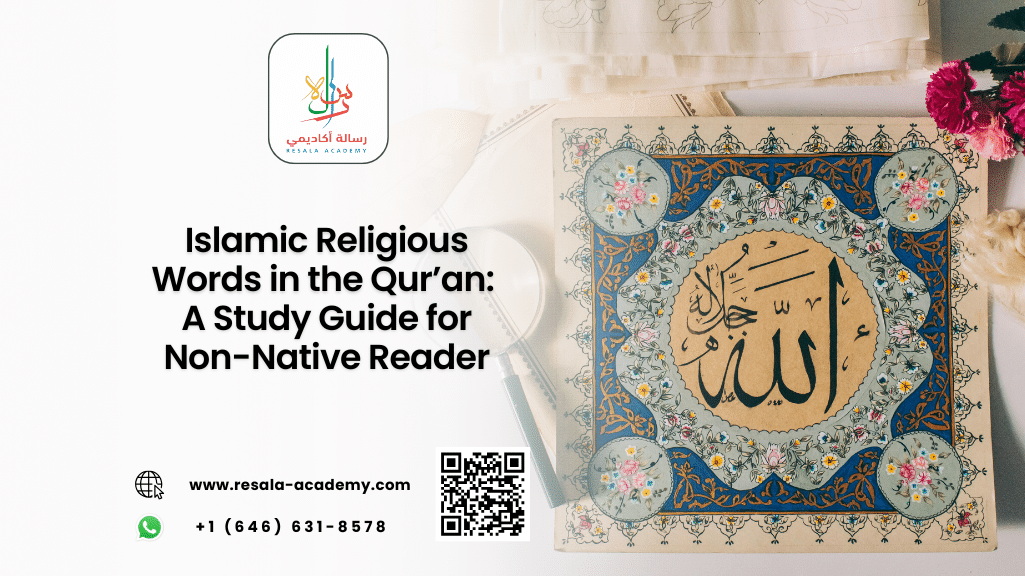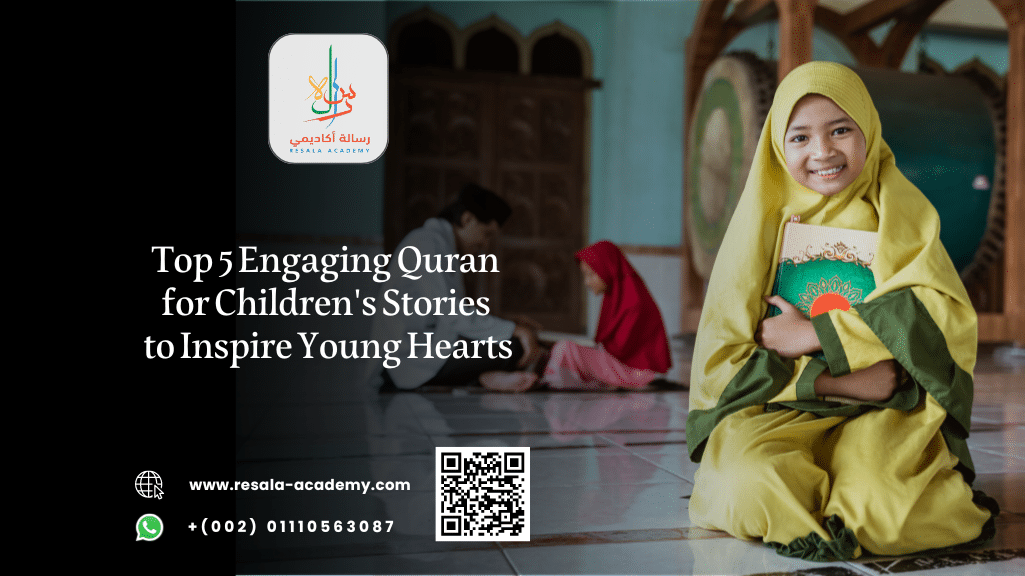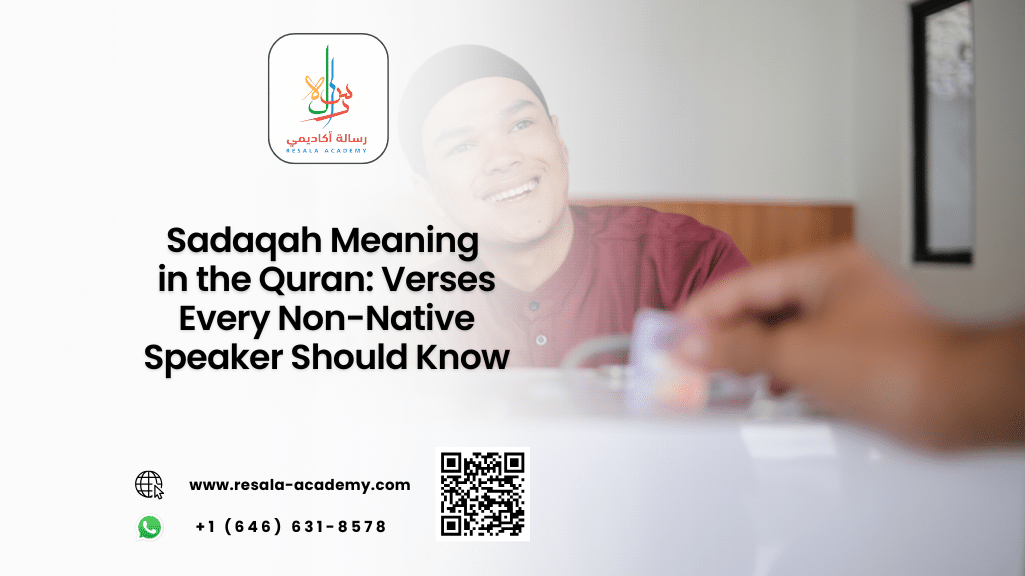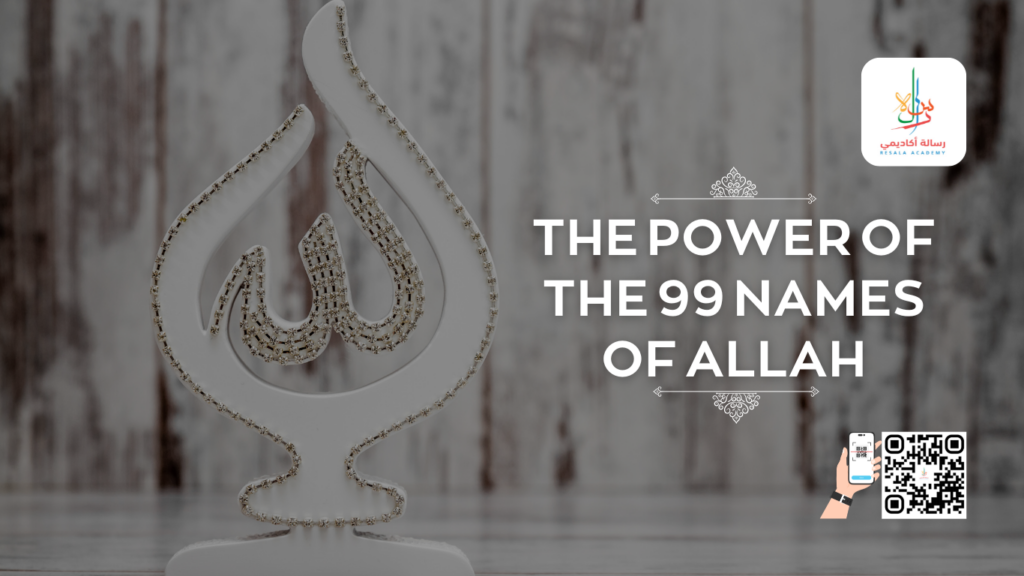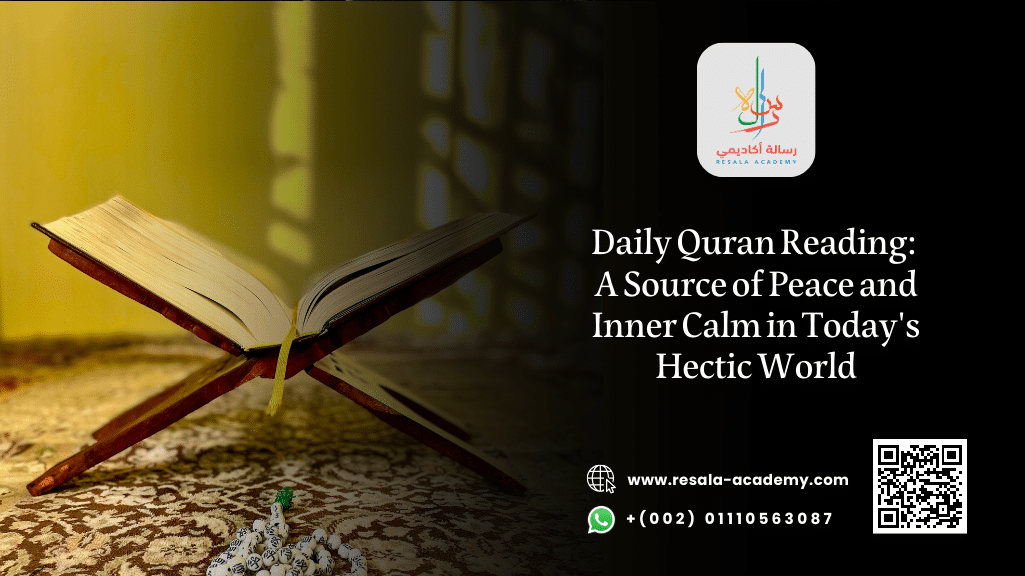Table of Contents
Islamic Religious Words in the Qur’an: A Study Guide for Non-Native Readers
Understanding the Qur’an is a profound journey—one that begins with mastering the essential Islamic religious words embedded in its verses. For non-native speakers, these terms are not just vocabulary; they are keys to unlocking the spiritual, historical, and linguistic treasures of the Islamic faith.
This comprehensive guide explores the most important Islamic religious words in the Qur’an, providing context, translation, and interpretation to help learners deepen their connection with the Holy Book.
Whether you’re a beginner in Arabic or a student of Islamic studies, this article is your gateway to understanding the divine language of the Qur’an. And with the expert guidance of Resala Academy, a premier online institution for Arabic and Quranic education, your learning journey becomes both accessible and enriching.
Why Islamic Religious Words Matter in the Qur’an
The Qur’an is not just a religious text—it is the literal word of Allah revealed in Arabic. Every word carries weight, and many terms have no direct equivalents in English. Understanding these Islamic religious words is essential for:
- Grasping the theological depth of the Qur’an
- Enhancing your spiritual connection during recitation
- Interpreting Islamic practices and beliefs correctly
- Appreciating the linguistic beauty of Arabic
For non-native speakers, learning these terms bridges the gap between translation and true comprehension.
The Language of Revelation: Arabic in the Qur’an
Arabic is the language chosen by Allah for His final revelation. The Qur’an states:
إِنَّا أَنزَلْنَاهُ قُرْآنًا عَرَبِيًّا لَّعَلَّكُمْ تَعْقِلُونَ
“Indeed, We have sent it down as an Arabic Quran1 so that you may understand.”
— Surah Yusuf 12:2
This verse highlights the importance of Arabic not just as a medium, but as a divine tool for understanding. Therefore, learning Islamic religious words in their original Arabic form is crucial for anyone seeking a deeper grasp of the Qur’an.
Core Islamic Religious Words Every Learner Should Know
Here are some of the most significant Islamic religious words found in the Qur’an, along with their meanings and contextual usage.
1. Allah (الله) – The One True Allah
Meaning: The unique name of Allah in Islam.
Qur’anic Reference:
اللَّهُ لَا إِلَٰهَ إِلَّا هُوَ الْحَيُّ الْقَيُّومُ
Allah! There is no god ˹worthy of worship˺ except Him, the Ever-Living, All-Sustaining.Significance: Central to the Islamic creed (Shahada), this word is the foundation of Tawheed (monotheism).
2. Islam (الإسلام) – Submission to Allah
Meaning: Submission, peace through surrender to Allah.
Qur’anic Reference:
إِنَّ الدِّينَ عِندَ اللَّهِ الْإِسْلَامُ
“Certainly, Allah’s only Way is Islam.”
— Surah Al-Imran 3:19Significance: Defines the faith and lifestyle of Muslims.
3. Iman (الإيمان) – Faith
Meaning: Belief in the unseen, including Allah, angels, books, prophets, and the Day of Judgment.
Qur’anic Reference:
ءَامَنَ ٱلرَّسُولُ بِمَآ أُنزِلَ إِلَيْهِ مِن رَّبِّهِۦ وَٱلْمُؤْمِنُونَ ۚ
“The Messenger ˹firmly˺ believes in what has been revealed to him from his Lord, and so do the believers. ”
— Surah Al-Baqarah 2:285Significance: A pillar of Islam, Iman is the internal conviction that drives external actions.
4. Taqwa (التقوى) – Allah-Consciousness
Meaning: Awareness and fear of Allah that leads to righteous behavior.
Qur’anic Reference:
إِنَّ أَكْرَمَكُمْ عِندَ اللَّهِ أَتْقَاكُمْ
“Surely the most noble of you in the sight of Allah is the most righteous among you.”
— Surah Al-Hujurat 49:13Significance: Taqwa is a recurring theme in the Qur’an and a key to spiritual success.
5. Salah (الصلاة) – Prayer
Meaning: The ritual prayer performed five times daily.
Qur’anic Reference:
وَأَقِمِ الصَّلَاةَ لِذِكْرِي
“So worship Me ˹alone˺, and establish prayer for My remembrance.”
— Surah Taha 20:14Significance: One of the Five Pillars of Islam, Salah is a direct link between the believer and Allah.
Read more about: How Many Times a Day Do Muslims Pray? A Complete Guide for Non-Native Learners
6. Zakah (الزكاة) – Almsgiving
Meaning: Obligatory charity, purification of wealth.
Qur’anic Reference:
وَأَقِيمُوا الصَّلَاةَ وَآتُوا الزَّكَاةَ
“Establish prayer, pay alms-tax”
— Surah Al-Baqarah 2:43Significance: A social and spiritual obligation that purifies wealth and supports the community.
7. Sawm (الصوم) – Fasting
Meaning: Abstaining from food, drink, and sin from dawn to sunset during Ramadan.
Qur’anic Reference:
يَا أَيُّهَا الَّذِينَ آمَنُوا كُتِبَ عَلَيْكُمُ الصِّيَامُ
“O believers! Fasting is prescribed for you”
— Surah Al-Baqarah 2:183Significance: A time for spiritual reflection and self-discipline.
8. Hajj (الحج) – Pilgrimage
Meaning: The journey to Mecca, obligatory once in a lifetime for those who can afford it.
Qur’anic Reference:
ءَامِنًۭا ۗ وَلِلَّهِ عَلَى ٱلنَّاسِ حِجُّ ٱلْبَيْتِ مَنِ ٱسْتَطَاعَ إِلَيْهِ سَبِيلًۭا ۚ
“Pilgrimage to this House is an obligation by Allah upon whoever is able among the people.”
— Surah Al-Imran 3:97Significance: A demonstration of unity and submission to Allah.
How Resala Academy Helps You Master These Words
Resala Academy’s courses specialize in teaching Arabic and Qur’anic studies to non-native speakers. Their structured curriculum focuses on:
- Vocabulary building with Islamic religious words
- Understanding Qur’anic grammar and syntax
- Interactive lessons with native Arabic instructors
- Memorization and Tajweed (correct recitation)
Whether you’re a beginner or an advanced learner, Resala Academy offers personalized programs such as Complete Quran Courses to help you internalize the language of the Qur’an.
Thematic Categories of Islamic Religious Words
To better understand the Qur’an, it helps to categorize vocabulary into themes:
Belief and Theology
- Tawheed (توحيد) – Monotheism
- Shirk (شرك) – Associating partners with Allah
- Qadr (قدر) – Divine Decree
Worship and Rituals
- Wudu (وضوء) – Ablution
- Qibla (قبلة) – Direction of prayer
- Dhikr (ذكر) – Remembrance of Allah
Ethics and Morality
- Sabr (صبر) – Patience
- Ihsan (إحسان) – Excellence in worship
- Amanah (أمانة) – Trustworthiness
Eschatology (End Times)
- Akhirah (الآخرة) – The Hereafter
- Jannah (جنة) – Paradise
- Jahannam (جهنم) – Hellfire
Learning these words in context enhances comprehension and retention.
Evidence from Hadith: The Prophet’s Emphasis on Language
The Prophet Muhammad ﷺ emphasized the importance of understanding the Qur’an:
خَيْرُكُمْ مَنْ تَعَلَّمَ الْقُرْآنَ وَعَلَّمَهُ
“The best among you are those who learn the Qur’an and teach it.”
— Sahih al-Bukhari 5027
This Hadith underscores the value of not just reciting but truly understanding the words of the Qur’an—a goal that Resala Academy helps learners achieve.
Specialized Usage of Islamic Religious Words in Qur’anic Contexts
Understanding how Islamic religious words function within different Qur’anic contexts enhances both linguistic and spiritual comprehension. These terms often shift in nuance depending on the surrounding verses, offering layers of meaning that are essential for accurate interpretation.
- Polysemy in Qur’anic Vocabulary: Many Islamic religious words, such as ‘Rahmah’ (mercy) or ‘Fitnah’ (trial), carry multiple meanings. Recognizing their contextual usage prevents misinterpretation and deepens tafsir (exegesis).
- Grammatical Patterns Reveal Deeper Meaning: Words like ‘Tawbah’ (repentance) appear in various verb forms (e.g., taaba, yatoobu) to indicate different aspects of human repentance.
- Semantic Fields in Revelation: Terms are often grouped thematically. For example, ‘Iman’, ‘Taqwa’, and ‘Sabr’ frequently appear together, highlighting a moral and spiritual framework central to Islamic ethics.
- Root Analysis for Deeper Insight: Studying triliteral roots (e.g., S-L-M for Islam, Salam, Muslim) reveals interconnected meanings and theological depth unique to the Arabic language.
- Chronological Revelation Matters: Understanding when and why certain Islamic religious words were revealed (Makki vs. Madani surahs) provides historical and situational context critical for serious learners.
Read more about: Top 10 Muslim Phrases Every Non-Native Speaker Should Learn for Daily Conversations
Integrating Islamic Religious Words into Arabic Language Acquisition
For non-native learners aiming to master Qur’anic Arabic, incorporating Islamic religious words into structured language learning accelerates fluency and comprehension. These terms serve as both linguistic anchors and spiritual signposts.
- Curriculum-Based Vocabulary Lists: Specialized programs like those at Resala Academy include curated lists of Qur’anic terms, ensuring learners acquire vocabulary with high relevance and frequency.
- Thematic Role-Playing Exercises: Simulating real-life Islamic scenarios (e.g., prayer, Hajj, Ramadan) helps learners internalize religious vocabulary in practical, memorable ways.
- Root-to-Word Mapping: Teaching students how to derive related words from a single root (e.g., ‘A-M-N’ → Iman, Ameen, Mu’min) builds a strong lexical foundation.
- Qur’anic Word Journals: Encouraging learners to maintain a personal glossary of Islamic religious words with meanings, contexts, and verse references fosters active engagement and retention.
- Interactive Tafsir Sessions: Breaking down verses word-by-word in live classes allows students to see how each term contributes to the overall message, reinforcing both vocabulary and comprehension.
These advanced strategies not only enrich vocabulary but also cultivate a deeper spiritual connection with the Qur’an—an outcome every non-native learner strives for.
Your Gateway to Qur’anic Mastery: Why Resala Academy is the Right Choice
Imagine being able to read the Qur’an and understand every word, every nuance, every divine message. With Resala Academy, that dream becomes a reality.
Why Choose Resala Academy?
✅ Native Arabic-speaking instructors
✅ Flexible online classes for all levels
✅ Specialized courses in Qur’anic vocabulary
✅ One-on-one tutoring and group sessions
✅ Affordable pricing with high-quality teaching
Whether you’re preparing for Ramadan, seeking to improve your Tajweed, or aiming to understand Islamic religious words in depth, Resala Academy is your trusted partner on this sacred journey.
👉 Start your free trial today!
Frequently Asked Questions (FAQs)
1. What are Islamic religious words?
Islamic religious words are terms used in the Qur’an and Hadith that carry specific theological, spiritual, or legal meanings. Examples include “Taqwa,” “Iman,” and “Salah.” These words are often untranslatable in full depth and require contextual understanding.
2. Why should non-native speakers learn these words in Arabic?
Learning these terms in Arabic allows for a deeper connection with the Qur’an. Translations often miss the nuances and layered meanings that the original Arabic conveys. It also enhances your prayer and understanding of Islamic rituals.
3. How can I memorize Islamic vocabulary effectively?
- Use flashcards with Arabic, transliteration, and meaning
- Practice with Qur’anic verses
- Enroll in structured programs like those offered by Resala Academy
- Engage in daily revision and repetition
4. Is it necessary to know Arabic to understand the Qur’an?
While translations help, knowing Arabic—especially Qur’anic Arabic—offers a richer, more accurate understanding. It allows you to grasp the linguistic miracles and rhetorical beauty of the Qur’an.
5. How does Resala Academy support non-native learners?
Resala Academy offers tailored courses for non-native speakers, focusing on vocabulary, grammar, and Qur’anic interpretation. Their interactive platform and experienced instructors make learning both effective and enjoyable.
Conclusion
Mastering Islamic religious words in the Qur’an is more than a linguistic exercise—it’s a spiritual transformation. These words connect you directly to the message of Allah, allowing you to internalize His guidance and live by it.
With the expert support of Resala Academy, non-native speakers can confidently navigate the sacred language of the Qur’an. Begin your journey today and unlock the timeless wisdom of the divine revelation.
📖 Ready to transform your Qur’anic understanding? Join Resala Academy now and start learning the words that change lives.
